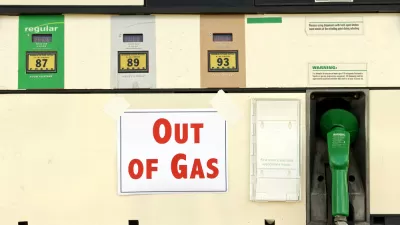In Michigan, after voters defeated a sales tax hike that would have triggered a gas tax hike, General Fund revenues are dedicated to roads. South Carolina legislators, eying a gas tax hike, may direct surplus General Fund revenues to roads instead.
It didn't take long for "Gov. Rick Snyder and Republican legislative leaders (to find) $287 million of surplus tax revenue to pour into road repairs next fiscal year," write Chad Livengood and Gary Heinlein of the The Detroit News Lansing Bureau. Had Proposition 1 passed on May 5, it would have have raised $1.3 billion for road repair by increasing the gas tax almost 9 cents per gallon.
In addition, the "Republican governor and legislative leaders set fiscal year 2016 spending targets Wednesday in a deal that dedicates $400 million toward transportation projects from the $9.5 billion general fund, said Kurt Weiss, spokesman for the state budget office," they add.
At (the May 15) state revenue estimating conference, the chairmen of the House and Senate appropriations committees said they hoped to spend all or most of any extra General Fund revenue on roads and bridges, not mass transit or airport projects that also are part of the transportation budget.
A new House committee formed to tackle road funding in the wake of the voters' overwhelming rejection of Proposition 1 appears to cement future reliance on general fund revenues for road repair, writes Livengood in a separate article.
The House Roads and Economic Development Committee began hearings Thursday [May 21] on a 12-bill package pushed by Speaker Kevin Cotter, R-Mount Pleasant, to raise about $1.05 billion more annually for roads, mostly through tapping existing tax revenue and relying on $700 million in future tax growth.
Of course, this is not new for the Great Lakes State. "In recent years, the Legislature has shored up the $3.7 billion transportation budget with general tax revenue because of declining gas tax revenue," write Livengood and Heinlein.
AASHTO Journal reports on May 22, "That marks the fifth straight year Michigan has shifted general fund revenue to transportation, the AP reported, and the $400 million transfer is up from $337 million in the last fiscal year."
Say what you will about the lack of transparency in Proposition 1, at least it was new revenue. By transferring general fund revenues to the state's ailing road fund, it does nothing to stem the problem of unsustainable road revenues that have contributed to Michigan spending less per capita on its roads than any other state.
Clearly Michigan is not alone in transferring so-called "surplus revenue" to road funds rather than having the legislature do what they should be doing—raising gas taxes, as the Nebraska legislature so boldly did on May 14—over the veto pen of the governor.
A recent op-ed co-authored by Americans for Prosperity President Ted Phillips speculated that South Carolina might be next to hike its gas tax. Surplus general fund revenue appears to have given pause to that movement, reports Cynthia Roldan of The Post and Courier.
South Carolina’s economic recovery is likely to provide a $400 million windfall which some lawmakers want to use to fix the state’s deteriorating roads, but others aren’t convinced that surplus funds are a long-term solution for transportation needs.
As posted earlier, $400 million happens to be the same amount the 10 cent gas tax bill the South Carolina House of Representatives passed on April 15 by an 87-20 margin would yield annually.
Sens. Larry Grooms, R-Charleston, and Senate President Pro Tempore Hugh Leatherman, R-Florence, are wary of a transportation plan that does not provide a steady revenue stream that can be relied on every year. Transportation officials have estimated that about $500 million more is needed annually just to keep roads and bridges from deteriorating further. Improving them would take more than $1 billion a year, according to the Department of Transportation.
The state's 16.75-cents-a-gallon [PDF], as of April 1, is the third lowest in the country, well below the national average of 30.46 cents, according to the American Petroleum Institute. The Associated Press reports that the Senate is debating a 12 cents gas tax increase bill, H.3579, that would also add additional fees resulting in an $800 million annual increase in road funding.
The last day of the South Carolina legislative season is June 4.
Hat tip: AASHTO Journal
FULL STORY: Snyder, leaders agree to add $287M more for roads

Planetizen Federal Action Tracker
A weekly monitor of how Trump’s orders and actions are impacting planners and planning in America.

Map: Where Senate Republicans Want to Sell Your Public Lands
For public land advocates, the Senate Republicans’ proposal to sell millions of acres of public land in the West is “the biggest fight of their careers.”

Restaurant Patios Were a Pandemic Win — Why Were They so Hard to Keep?
Social distancing requirements and changes in travel patterns prompted cities to pilot new uses for street and sidewalk space. Then it got complicated.

Platform Pilsner: Vancouver Transit Agency Releases... a Beer?
TransLink will receive a portion of every sale of the four-pack.

Toronto Weighs Cheaper Transit, Parking Hikes for Major Events
Special event rates would take effect during large festivals, sports games and concerts to ‘discourage driving, manage congestion and free up space for transit.”

Berlin to Consider Car-Free Zone Larger Than Manhattan
The area bound by the 22-mile Ringbahn would still allow 12 uses of a private automobile per year per person, and several other exemptions.
Urban Design for Planners 1: Software Tools
This six-course series explores essential urban design concepts using open source software and equips planners with the tools they need to participate fully in the urban design process.
Planning for Universal Design
Learn the tools for implementing Universal Design in planning regulations.
Heyer Gruel & Associates PA
JM Goldson LLC
Custer County Colorado
City of Camden Redevelopment Agency
City of Astoria
Transportation Research & Education Center (TREC) at Portland State University
Camden Redevelopment Agency
City of Claremont
Municipality of Princeton (NJ)



























